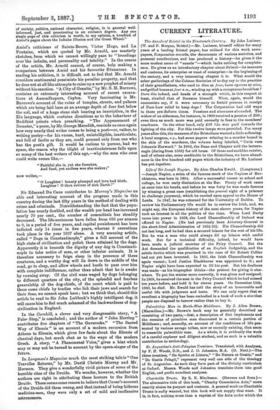CURRENT LITERATURE.
The Annals of Bristol in the Nineteenth Century. By John Latimer. (W. and F. Morgan, Bristol.)—Mr. Latimer, himself editor for many years of a leading Bristol paper, has utilised for this work news-
papers, Corporation records, the documents of various societies, and personal recollections, and has produced a history—he gives it the more modest name of "annals "—which lacks nothing for complete- ness. He gives us an introductory chapter about Bristol—its manners and customs, its enterprise or want of enterprise—in the beginning of the century, and a very interesting chapter it in. What would the sober gatherings of the Colston Societies of to-day say to the practice
of their grandfathers, who used to dine at _four, have oysters at nine, and grilled bones at/our a.m., winding up with a sumptuous breakfast P Dora ilia indeed, and heads of a strength which, in this respect at
least, rivalled that of Socrates himself. What, again, would the economists say, if it were necessary to forbid persons in receipt of Poor-Law relief to keep doge P The Corporation had odd ways in thew pre-Reform times,. Pensions and einem:wee abounded. The
widow of an alderman, for instance, in 1800 received a pension of £t10; even then as much more was paid annually in fees to the members' coachmen. On the other hand, only £26 12s. was paid towards the
lighting of the city. For this twelve lamps were provided. For many years after this, the manners of the Bristol ian s wanted a little softening.
A local surgeon, e.g., had some papers relating to a murder bound in
the skin of the murderer, the volume being labelled, " Cutis vets Johannis Horwood." In 1802, the Dean and Chapter gold the lectern.
eagle (dating from 1683) for old brass. Of those and snaillike entriee, and of others also, more creditable to the Briatolians, we have abund- ance in the five hundred odd pages which the industry of Mr. Latimer has put together.


































 Previous page
Previous page